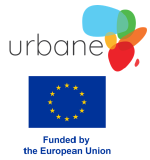Mahomed Demba Kamara's farm
Agroecology, diversity of crops, animal production, compost, intercropping
Mahomed Demba Kamara
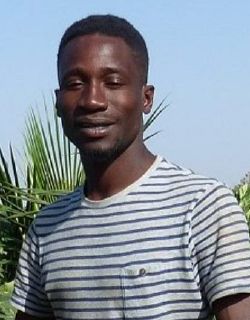
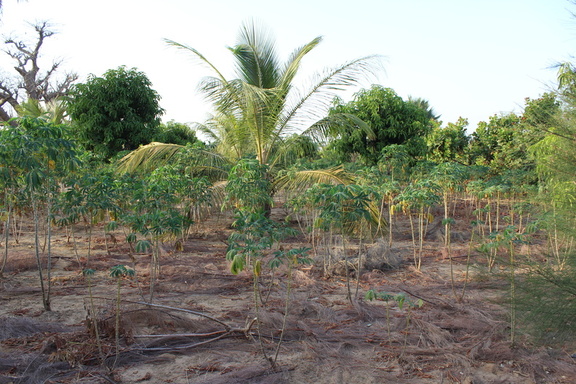
Mohamed Demba Kamara, a farmer in Samba Dia, Senegal, cultivates his lands according to the principles of agroecology. Here is a portrait of his farm.
Context
- Name: Mahomed Demba Kamara.
- Location: Samba Dia. Senegal.
- Installation date : 2017.
- Cultivated Area: 1 ha. Vegetable area: 150 m² but can go up to 600 m² when papayas are uprooted (after 2 years of production).
- Soil texture: Sandy soil.
- Number of people working on the farm: 2.
- Productions: Poultry farming (meat), Cassava, Carrot, Bell pepper, Chili pepper, Hibiscus, Lettuce, Onion, Strawberry, Papaya, Banana, Lemon, Grapefruit, Orange, Mango, Guava, Coconut, Cashew nut.
- Climate: Samba Dia has a hot and dry desert climate (BWh) according to the Köppen-Geiger classification. The average temperature in Samba Dia is 28.6°C throughout the year, and the average annual precipitation is 678.5mm. Significant wind throughout the year.
- Education/Training/Life Journey: Mahomed comes from the village of Samba Dia. His mother is a veterinarian and his father was an agronomic technician. He worked as a farm laborer at the beginning of the Kaydara agroecological experimental farm and stopped at the age of 19 after obtaining his driver's license and because he did not see the possibility of achieving economic balance through his work.
- In 2007: He travels to Europe via Senegal, then Morocco, and returns via Mauritania in 2011. During his journey, he held various jobs (construction, driver, etc.).
- In 2011: He leaves his village for Mauritania because, according to him, the elders did not set a good example in agriculture.
- In 2017: He returns to Samba Dia and decides to start a poultry farm for 250 meat chickens. He contacts Gora Ndiaye, president of the Kaydara farm, and explains his journey and the problems he encountered. He then begins training at Kaydara funded by its partners. Following his father's death in 2007, the family land had been sold, so he no longer had any available agricultural land. Kaydara and the municipality of Samba Dia therefore provide him with 1 ha in October 2017. He starts his training, learns, and implements multi-tiered farming. The beginnings are not easy.
- Other activities: Mahomed is a well-digger, has afforestation activities, and is also a traditional organic livestock trainer at Kaydara.
Motivations and objectives
Mahomed wants to preserve ancient and local breeds of chickens. He also wants to set an example and contribute to doing something better.
Agronomic aspect
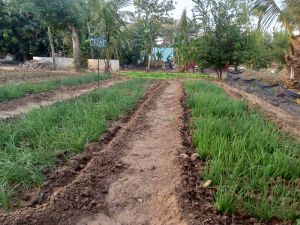
Vegetable productions
Diversity of vegetable crops
1700-1800 cassava plants (yielding 70 sacks of 70kg = 4.9 T), carrots, bell peppers, chili peppers, hibiscus (bissap), lettuces.
Diversity of root crops
- 7 beds of onions (used for his own consumption and the leaves for the chickens).
- 4 beds of onions combined with strawberries.
- 8 beds of lettuces (half for personal consumption, ¼ for poultry, and for sale).
- 4 beds of strawberries for personal consumption.
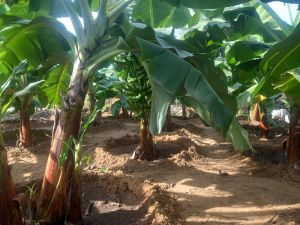
Diversity of fruit trees
- 75 papaya trees: yielding 2 T.
- 30 banana trees: 70 kg from the first harvest this year.
- 28 citrus trees in total: lemons with an ongoing annual production of 100 kg, grapefruits 150-200 kg from 2 trees, and oranges.
- 40 cashew trees.
- 20 coconut trees which are 5 years old and bearing their first fruits.
- 37 mango trees: first production in 2022.
Seed management
Mahomed bought banana seeds to provide potassium for the papayas to enhance their quality. He sells young mango trees in exchange for seeds from old varieties of mangoes. For guava cultivation and seedling production, he either uses self-produced seeds from his farm or buys seeds. Citrus seeds are produced on the farm, and trees are then grafted from cultivars present on the farm. For vegetable seeds, Mahomed obtains them from Gora.
Animal productions
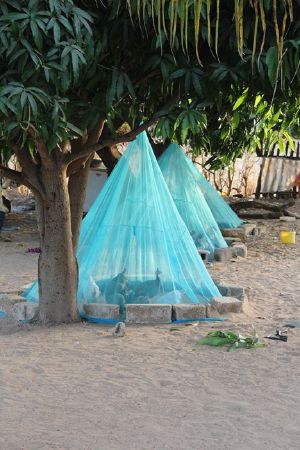
Meat chicken workshop
Mahomed started his poultry farming with about twenty chickens. He keeps one rooster for every 10 hens. Initially, he acquired 4-5 month-old hens from a local breeder.
Health
The chickens are raised without the use of antibiotics or chemical dewormers. Internal and external deworming, often necessary during the rainy season, is carried out using preparations and macerates made from plants produced on the farm or locally available ones: neem, peppers, and wormwood leaves. Moringa is also used for these purposes. The two main diseases the farmer faces during the rainy season are pox and coccidiosis.
Since veterinary treatments are expensive, pox is treated with a mixture of lemon and methylene blue. Coccidiosis is treated with powdered wormwood and ice plant (Mesembryanthemum crystallinum).
To reduce the impact of diseases and their spread, waterers are emptied and cleaned every day. The bedding, made of straw and sand, is changed every 15 days, and perches for the animals to sleep on are set up to limit disease transmission and spread. "Dust baths" containing ashes and sand are provided to the animals on the farm so they can self-deworm.
Feeding
Mahomed prepares the mixture for his chickens' feed himself. He makes a "homemade" mix of cereals purchased during harvesting (aiming to reduce costs). The mix for the chickens consists of sorghum, millet, maize, fish meal, as well as cowpea or pigeon pea flour for the protein ration. The cost of feeding per chicken is approximately 2500 FCFA.
Marketing
Sales peaks occur during religious festivities or major local events. When the hens have completed more than 3 broods, they are sent for fattening or sold for meat consumption. Chickens are sold after 6 to 7 months.
Agricultural practices
Soil fertility management
Crop rotation
In order to optimize soil fertilization, reduce organic matter depletion, and limit pests and diseases, Mahomed practices crop rotation with fallow periods in vegetable cultivation. He fertilizes all crops and adjusts the fertilization plan according to the type of crop. He adapts the fertilization plan based on the appearance and development of the plants.
Crop association
Another practice implemented for fertility management and space optimization, as well as interactions between plants, is crop association. Mahomed has implemented an association this year: Onions + strawberries on some of his vegetable beds.
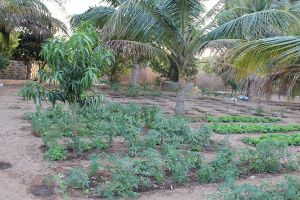
Multi-tiered cultivation
Half of the orchard is an association of mangoes and coconut trees: 35 mango trees and 20 coconut trees. For each coconut tree, he plants 4 mango trees. The coconut trees occupy the upper space, the mango trees the lower stratum, and below he can implement vegetable cultivation and/or poultry farming. The vegetable cultivation areas are surrounded by barriers to prevent chickens from entering. The other part of the orchard is planted with citrus fruits (lemons, grapefruits), soursop, oranges, coconut, and raffia palm.
Green manure
During the rainy season, Mahomed cultivates cowpea (Vigna unguiculata), a legume that not only provides a quality protein source for humans but also enriches the soil with nitrogen and helps reduce weeding and fertilization for the subsequent crop. He also grows pigeon pea (Cajanus cajan), sown directly before vegetable crops for the same purpose. These two cover crops, in addition to fixing nitrogen in the soil, produce plant proteins used for chicken feed.
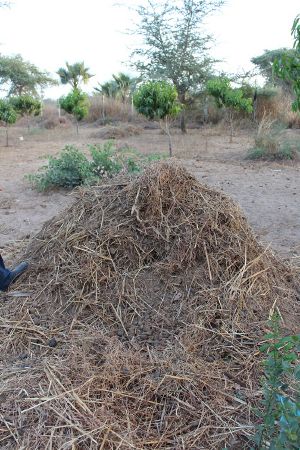
Fertilization and organic manure
Mahomed has developed his own system to produce fertilizer while minimizing costs. He has developed chicken farming to be self-sufficient in chicken manure to meet the macronutrient (NPK) needs of his trees and vegetable plants. His banana production also serves partly to produce fertilizer (especially for potassium needs). Additionally, he exchanges hay for cow manure with nearby livestock breeders to supplement his mixture.
- Every 15 days, the chicken coop is cleaned: he collects the manure.
- Banana: The peel and fruit are mixed with the manure.
- Hay in Sambe Dia: In return, breeders give him cow manure.
- He mixes everything in a basin for decomposition.
- He obtains solid compost and liquid compost: this is what he uses for vegetable cultivation and coconut trees.
Pest management
Biopesticides and macerates
Mahomed does not use chemical pesticides on his farm. To address pest, insect, and disease problems, he produces biopesticides and macerates. For example, to combat whiteflies on papayas, he prepares a treatment using fermented lemon peel macerate over 2 to 3 months. Every year he produces about 200 kg of lemons, of which he sells only 150 kg. He uses the seeds for the nursery, and the pulp and peel for maceration. He sells his lemon biopesticide for 2500 FCFA per liter. The treatment is applied by hand cleaning the fruits and stems with coconut fiber soaked in macerate.
For chili peppers, he uses a neem oil treatment. To combat aphid attacks, he uses a garlic decoction: 4 teaspoons of garlic per 2 liters of water.
He never uses a single treatment as insects become accustomed to it, he creates a mixture of neem oil and garlic.
The third biopesticide he produces consists of 3 different plants: tobacco + katiyanta + mumbu (or mundu, a plant that only grows in the rainy season that insects detest).
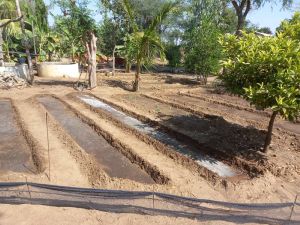
Soil work
Mahomed has a small cultivator that he only uses for cassava cultivation. The cultivation beds are wetted, left for 2 days, then he manually weeds them. He uses a hoe to create the beds and their boundaries. For chili pepper and bell pepper cultivation, he works to a depth of 15 cm. For carrots and turnips, he works to a depth of 30 cm.
Hydraulic system
Source, volume, and flow
He pumps about 3000 L of water per day. With 2 pumps, a solar pump and a gasoline engine pump.
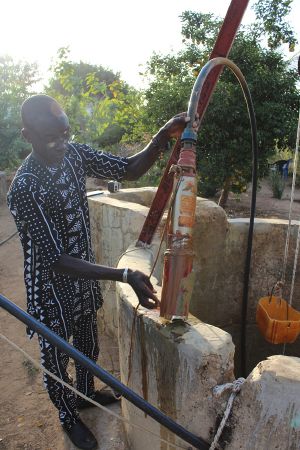
Irrigation method
From 2017 to 2019, the entire farm was watered with watering cans. Subsequently, Mahomed invested in a gasoline engine pump, and then in a solar pump (600 watts, 3 panels of 3x250 watts).
Irrigation is carried out in different ways on the farm depending on the crops: hose and manual irrigation. At the beginning of the farm, the system consisted of a well from which water was extracted using a pulley.
- The system powered by the solar pump is used to irrigate the vegetable gardens, coconut trees, and papayas.
- The system powered by the gasoline engine pump is used to irrigate citrus trees with a hose as well as the vegetable beds.
- The pump also fills the basin from which he draws water for manual irrigation.
Irrigation frequency
- For vegetable gardens, banana trees, and papayas, Mahomed waters daily, averaging 3 hours per day (1.5 to 2 people).
- Coconut trees are watered every 3 days.
- Mango trees no longer require watering for the past few years.
Social aspect
Satisfactions / Dissatisfactions
- Workload:
- Watering: 4 hours per day (2 hours each with 2 people). Now 3 hours per day.
- Early morning harvesting: 3 hours per week.
- Employee: 1 young person working for him.
- In a week: 8 hours per day, totaling 56 hours.
- Well-digging activity: The workload varies depending on the season and demand. Systems are rare, so he is often in demand, approximately 15 times a year for 10 days each time. Therefore, he often leaves the farm.
- Economic: 10.
- Work comfort: 5.
- Social: 8.
- Living environment: 10.
- Cooperation with other farmers: 10. He trains young people who do internships at the Kaydara farm school. There, they receive good training.
Scale from 1 = very dissatisfied, to 10 = very satisfied.
Technical support / Aid
Mahomed no longer receives external assistance.
Economic Aspect
Land
The land has been made available to Mahomed, where he has lived for 6 years. Once his training at the Kaydara farm school was completed, the land was financed by Kaydara's partners. They helped him by giving him the land to serve as an example.
Equipment
- Gasoline Pump: 90,000 FCFA.
- Solar Pump: 350,000 FCFA.
- Chicken Coop: 1,500,000 FCFA.
- Motorcycle: 500,000 FCFA.
- Building: Housing.
Donations, Financial Aid
No funding.
Expenses
- Animal Feed: 2,100,000 FCFA. 2500 FCFA per chicken for feed: sorghum = 300 FCFA/kg, millet = 350 FCFA/kg. (Total sorghum per year: 2.5-3 tons and the same for millet.)
- Worker's salary: The worker is paid 40,000 FCFA per month (= 360k€ per year).
- Fuel for the motorcycle and pumps: 5,000 FCFA for 10-12 days x 8 months per year = 120,000 FCFA for gasoline.
- Production transportation: Each trip costs 2,000 FCFA, 1-2 times per week. So, 4000 FCFA per week, about 200,000 FCFA per year for transportation.
- Manure: 28,000 FCFA (1 sack = 1,000 FCFA) + transportation: each year, minimum 100,000 FCFA for manure excluding transportation + 100,000 FCFA for transportation.
Income
- Chickens:
- Brahma chicken: For now, Mahomed does not have an incubator so he does not do industrial farming: about 350 chickens that he can sell for up to 7,000 FCFA / chicken during festive periods (10-year goal: 3000 chickens).
- Classic chicken: 5000 FCFA / chicken. He sold 3 lots of 250 = 3,750,000 FCFA.
- Papaya: 2.2 tons: 700 FCFA / kilo.
- Mango: 700 kg of mangoes that he sells between 1000 and 1500 FCFA / kg. He has been selling them for 6 years.
- Vegetable gardening: 300,000 FCFA for vegetable gardening.
Mahomed reinvests everything he earns in the farm and its ancillary activities. He has no debts.
Commercial strategy / Outlets
- One of the commercial strategies that Mahomed would like to develop in the future is to create or integrate into a network to promote the meat of chickens raised with agroecological principles. Currently, it is very difficult for him to promote the meat he produces as "organic," as networks are rare or nonexistent in the area where he is located.
- Restaurant: Sale every Friday of fruits, vegetables, and chickens in a restaurant that seeks chickens raised according to the principles of organic agriculture.
- Diversification of production: Chickens (meat and eggs) as main activities but also vegetable gardening and nursery activities with the sale of fruit tree seedlings. Price of chickens aged 7 months: 7-8,000 FCFA
Mahomed's advice
Advice on agroecological practices
- Advice to the youth: Diversify, try a bit of everything at first, and see what works and develop it. For example, multi-layered cultivation and associations, but also activities on the farm (chickens, vegetable gardening, nursery, etc.).
- If one has talent, they should seek networks to sell more and attract people. It's important to showcase one's skills and achievements.
- Produce your own seeds, biopesticides, and as many inputs as possible on the farm to reduce costs and avoid dependency.
Advice for the economic model
- Reduce the number of trees to focus on chicken farming.
- If there is no funding for the farm project, find another activity to finance the farm. Mahomed has his well-digging activity, he trains others, and he also does afforestation activities for people who buy land. He then traces and plants trees on the land. He produces half of the seedlings on his farm (lemon, mango, and coconut) and buys the other half from women.
A young person with ambition and courage can achieve their dreams without funding. It requires patience, preservation, and honesty. If people trust you, it brings many benefits.
Challenges faced
There are always challenges, but they have learned to overcome them. The main difficulty is the problem of ticks and fleas on chickens and chicks and pest management in vegetable gardening.
Perspectives
Mahomed's future projects include expanding the size of the chicken coop and the number of chickens by purchasing an incubator and also to increase its surface area to produce more and employ more young people.
Photo gallery
Sources
Interview with Mahmed Demba Kamara conducted in February 2024 by the team of Ver de Terre Production as part of the Urbane project. Photo credits: Mahomed Demba Kamara.
This page was written in partnership with the Urbane project and with the financial support of the European Union.

